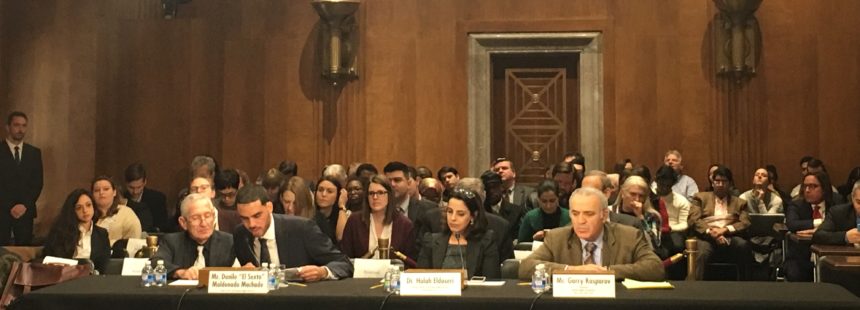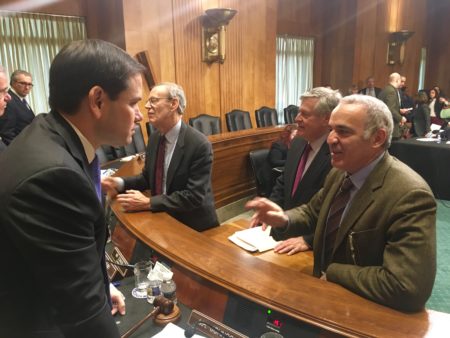

 It was an honor to be invited to speak to the US Senate subcommittee about US leadership on democracy and human rights yesterday. My prepared remarks are below, but I encourage you to follow the link and to watch the opening comments by Senators Rubio and Menendez, the other speakers, and the Q & A. (A transcript should be available there soon.) Senator Rubio’s opening remarks were very impressive and a reminder that the craziness happening in the White House these days is not all the US government does! The world is becoming a more dangerous, less free place every year, and a decade of American retreat is the major reason for this.
It was an honor to be invited to speak to the US Senate subcommittee about US leadership on democracy and human rights yesterday. My prepared remarks are below, but I encourage you to follow the link and to watch the opening comments by Senators Rubio and Menendez, the other speakers, and the Q & A. (A transcript should be available there soon.) Senator Rubio’s opening remarks were very impressive and a reminder that the craziness happening in the White House these days is not all the US government does! The world is becoming a more dangerous, less free place every year, and a decade of American retreat is the major reason for this.
The heads of the three major American global democracy initiative organizations were the first panel, and I was joined by two other dissidents in the second panel, Dr. Halah Eldoseri of Saudi Arabia and Danilo “El Sexto” Maldonado Machado of Cuba. I already knew El Sexto, as the Human Rights Foundation has supported him and his work. He was only recently released from prison for the fourth time, jailed and tortured as so many Cubans for nothing more than expressing his dissent against the Castro regime.
———————————-
Democracy and Human Rights: The Case for U.S. Leadership
Subcommittee on Western Hemisphere, Transnational Crime, Civilian Security, Democracy, Human Rights, and Global Women’s Issues
Thursday, February 16, 2017
Comments by Garry Kasparov: Chairman of the Human Rights Foundation and author of Winter Is Coming: Why Vladimir Putin and the Enemies of the Free World Must Be Stopped
My thanks to Chairman Rubio and Senator Menendez for inviting me to be here today.
As one of the countless millions of people who were freed or protected from totalitarianism by the United States of America, it is easy for me to talk about the past. To talk about the belief of the American people and their leaders that this country was exceptional, and had special responsibilities to match its tremendous power. That a nation founded on freedom was bound to defend freedom everywhere. I could talk about the bipartisan legacy of this most American principle, from the Founding Fathers, to Democrats like Harry Truman, to Republicans like Ronald Reagan. I could talk about how the American people used to care deeply about human rights and dissidents in far-off places, and how this is what made America a beacon of hope, a shining city on a hill. America led by example and set a high standard, a standard that exposed the hypocrisy and cruelty of dictatorships around the world.
But there is no time for nostalgia. Since the fall of the Berlin Wall, the collapse of the Soviet Union, and the end of the Cold War, Americans, and America, have retreated from those principles, and the world has become much worse off as a result. American skepticism about America’s role in the world deepened in the long, painful wars in Afghanistan and Iraq, and their aftermaths. Instead of applying the lessons learned about how to do better, lessons about faulty intelligence and working with native populations, the main outcome was to stop trying.
This result has been a tragedy for the billions of people still living under authoritarian regimes around the world, and it is based on faulty analysis. You can never guarantee a positive outcome—not in chess, not in war, and certainly not in politics. The best you can do is to do what you know is right and to try your best. I speak from experience when I say that the citizens of unfree states do not expect guarantees. They want a reason to hope and a fighting chance. People living under dictatorships want the opportunity for freedom, the opportunity to live in peace and to follow their dreams. From the Iraq War to the Arab Spring to the current battles for liberty from Venezuela to Eastern Ukraine, people are fighting for that opportunity, giving up their lives for freedom. The United States must not abandon them.
The United States and the rest of the free world have an unprecedented advantage in economic and military strength today. What is lacking is the will. The will to make the case to the American people, the will to take risks and invest in the long-term security of the country, and the world. This will require investments in aid, in education, in security that allow countries to attain the stability their people so badly need. Such investment is far more moral and far cheaper than the cycle of terror, war, refugees, and military intervention that results when America leaves a vacuum of power. The best way to help refugees is to prevent them from becoming refugees in the first place.
The Soviet Union was an existential threat, and this focused the attention of the world, and the American people. The existential threat today is not found on a map, but it is very real. The forces of the past are making steady progress against the modern world order. Terrorist movements in the Middle East, extremist parties across Europe, a paranoid tyrant in North Korea threatening nuclear blackmail, and, at the center of the web, an aggressive KGB dictator in Russia. They all want to turn the world back to a dark past because their survival is threatened by the values of the free world, epitomized by the United States. And they are thriving as the U.S. has retreated. The global freedom index has declined for ten consecutive years. No one likes to talk about the United States as a global policeman, but this is what happens when there is no cop on the beat.
American leadership begins at home, right here. America cannot lead the world on democracy and human rights if there is no unity on the meaning and importance of these things. Leadership is required to make that case clearly and powerfully. Right now, Americans are engaged in politics at a level not seen in decades. It is an opportunity for them to rediscover that making America great begins with believing America can be great.
The Cold War was won on American values that were shared by both parties and nearly every American. Institutions that were created by a Democrat, Truman, were triumphant forty years later thanks to the courage of a Republican, Reagan. This bipartisan consistency created the decades of strategic stability that is the great strength of democracies. Strong institutions that outlast politicians allow for long-range planning. In contrast, dictators can operate only tactically, not strategically, because they are not constrained by the balance of powers, but cannot afford to think beyond their own survival. This is why a dictator like Putin has an advantage in chaos, the ability to move quickly. This can only be met by strategy, by long-term goals that are based on shared values, not on polls and cable news.
The fear of making things worse has paralyzed the United States from trying to make things better. There will always be setbacks, but the United States cannot quit. The spread of democracy is the only proven remedy for nearly every crisis that plagues the world today. War, famine, poverty, terrorism–all are generated and exacerbated by authoritarian regimes. A policy of America First inevitably puts American security last.
Global American leadership is required because there is no one else, and because it is good for America. There is no weapon or wall that is more powerful for security than America being envied, imitated, and admired around the world. Admired not for being perfect, but for having the exceptional courage to always try to be better. Thank you.

